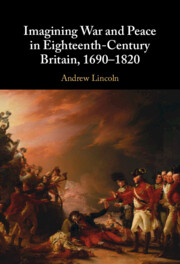Book contents
- Imagining War and Peace in Eighteenth-Century Britain, 1690–1820
- Imagining War and Peace in Eighteenth-Century Britain, 1690–1820
- Copyright page
- Dedication
- Contents
- Figures
- Preface
- Introduction
- Part I Developing Ideals
- Part II Developing Questions
- Chapter 5 War and the ‘Elevation’ of the Novel
- Chapter 6 War and the ‘Science of Man’
- Part III War and Peace in an Age of Revolutions
- Part IV The Landscape of Conquest
- Further Reading
- Index
Chapter 5 - War and the ‘Elevation’ of the Novel
from Part II - Developing Questions
Published online by Cambridge University Press: 10 January 2024
- Imagining War and Peace in Eighteenth-Century Britain, 1690–1820
- Imagining War and Peace in Eighteenth-Century Britain, 1690–1820
- Copyright page
- Dedication
- Contents
- Figures
- Preface
- Introduction
- Part I Developing Ideals
- Part II Developing Questions
- Chapter 5 War and the ‘Elevation’ of the Novel
- Chapter 6 War and the ‘Science of Man’
- Part III War and Peace in an Age of Revolutions
- Part IV The Landscape of Conquest
- Further Reading
- Index
Summary
This considers the relationship between the elevation of the novel into moral respectability and the turn to anti-heroic discourse. The novels of Daniel Defoe (works influenced by rogue narratives) show little interest in representations of feminine virtue of the kind Richardson foregrounds in his influential Pamela. Where Defoe represents martial violence with relatively few reservations, in the novels of Richardson and Fielding, a concern with feminine virtue is accompanied by anti-heroic discourse which entails critical views of war. As novelists, Fielding and Smollett both represent the malign effects of modern war while, in Amelia, Fielding even represents a form of pacifist feeling. The chapter ends with discussion of the anonymous Ephraim Tristram Bates, in which a potentially excellent soldier is defeated by a corrupt system of military patronage, and of Sternes Tristram Shandy, in which martial virtue has become a matter of moral sentiment, destructive of domestic order.
Keywords
- Type
- Chapter
- Information
- Imagining War and Peace in Eighteenth-Century Britain, 1690–1820 , pp. 123 - 156Publisher: Cambridge University PressPrint publication year: 2023

